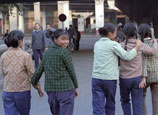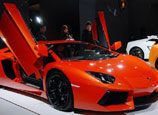
Soft power
What about cultural power?
Another word for cultural power is "soft power," a subject that has increasingly over recent years challenged Chinese policymakers and thought leaders.
There have been some developments. The opening ceremony of the 2008 Summer Olympics projected some brilliant images of Chinese tradition; the Chinese pavilion of the Shanghai World Exposition in 2010 was an architectural masterpiece, while its techno-artistic display of the recreation of the scroll "Along the River during the Qingming Festival by" Zhang Zeduan (1085-1145) was simply brilliant.
Similarly, Chinese contemporary authors are getting to be much better known in the world, a trend which should get a spurt with this year's award of the Nobel Prize of Literature to Mo Yan (born in 1955).
China's rising cultural flourishing is reflected not only in the traditional arts, but also in its absorption of Western culture. China stands out especially in its embrace of Western classical music; the annual Beijing Music Festival is becoming increasingly known and hailed.
While these developments are important and impressive, it no doubt remains the case that China's global cultural reach remains modest when compared to that of the US and some European countries.
Though Chinese universities are attracting more and more foreign students, the numbers pale in comparison with American, European and Australian universities. Indeed, Western soft power still exerts great impact on China as many of its students flock to Western universities.
As its economic power matures and its population ages, China should increasingly develop its cultural fields. In the course of the decades ahead, as China may be exporting fewer goods, it should aim at exporting more culture.
Soft (cultural) power is the best means to make friends and influence people.
Dr Jean-Pierre Lehmann is emeritus professor of international political economy at IMD, Lausanne, Switzerland, and Founder of The Evian Group.

















![]()
